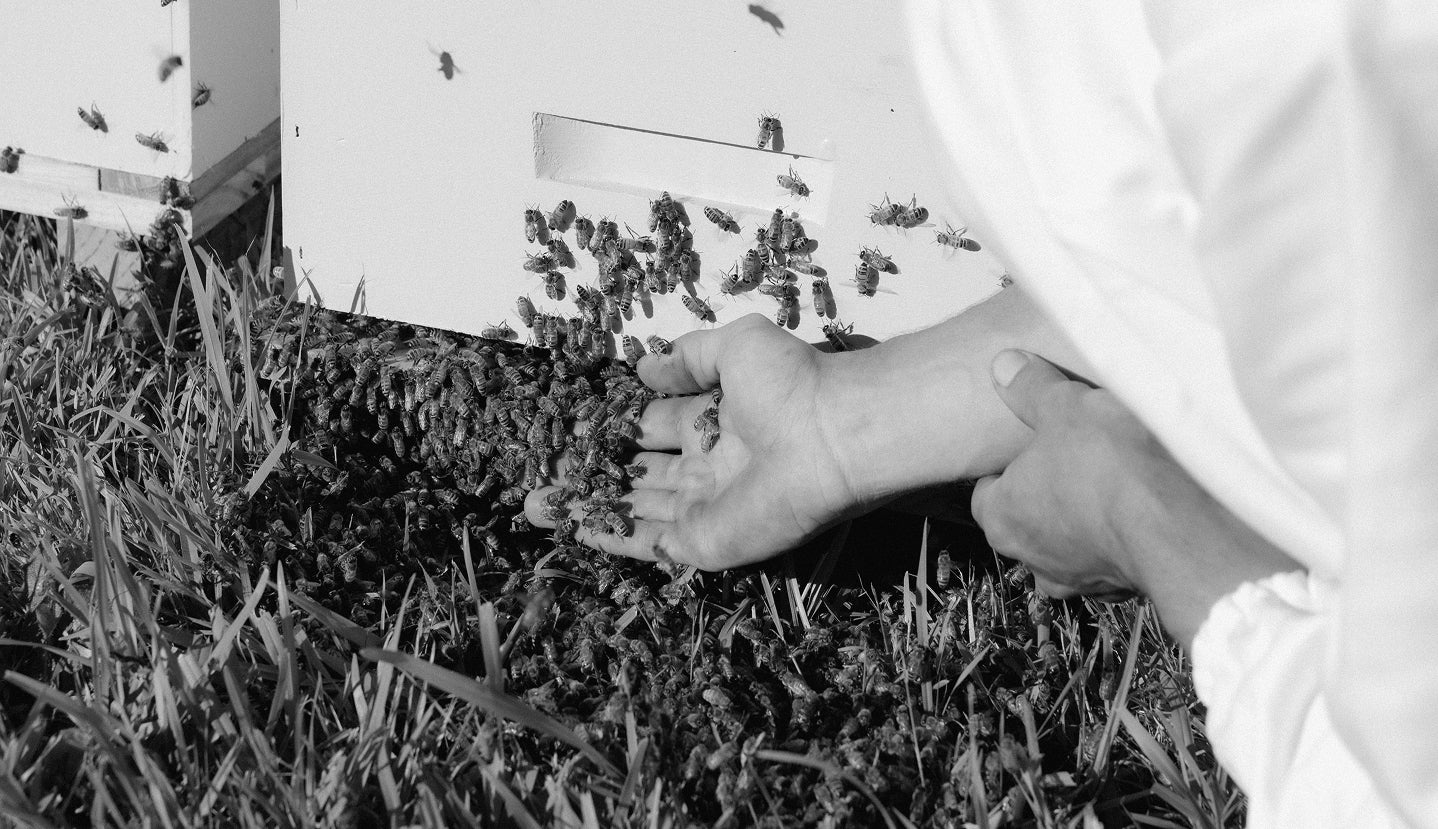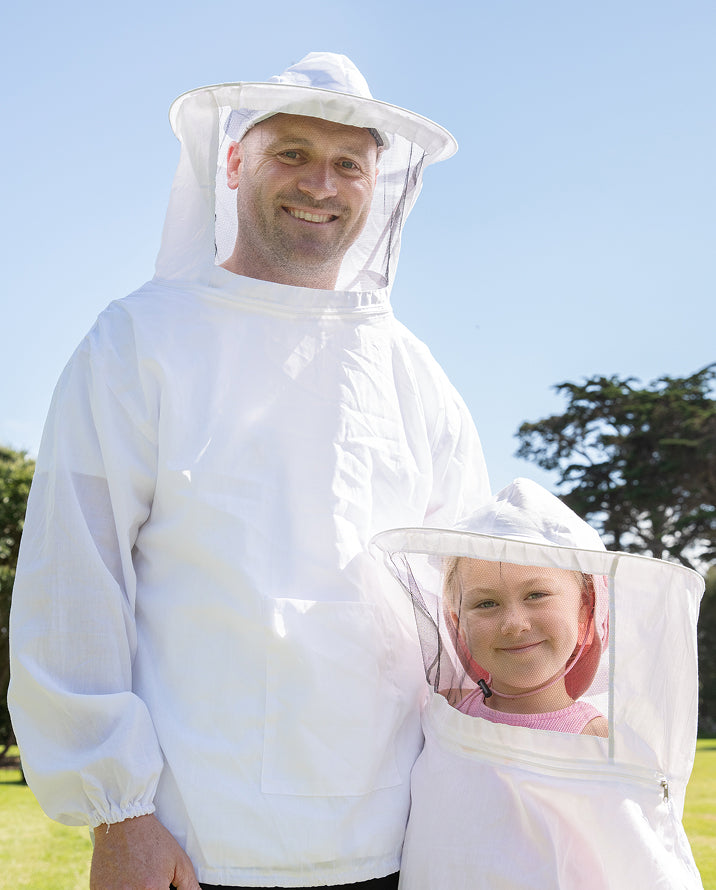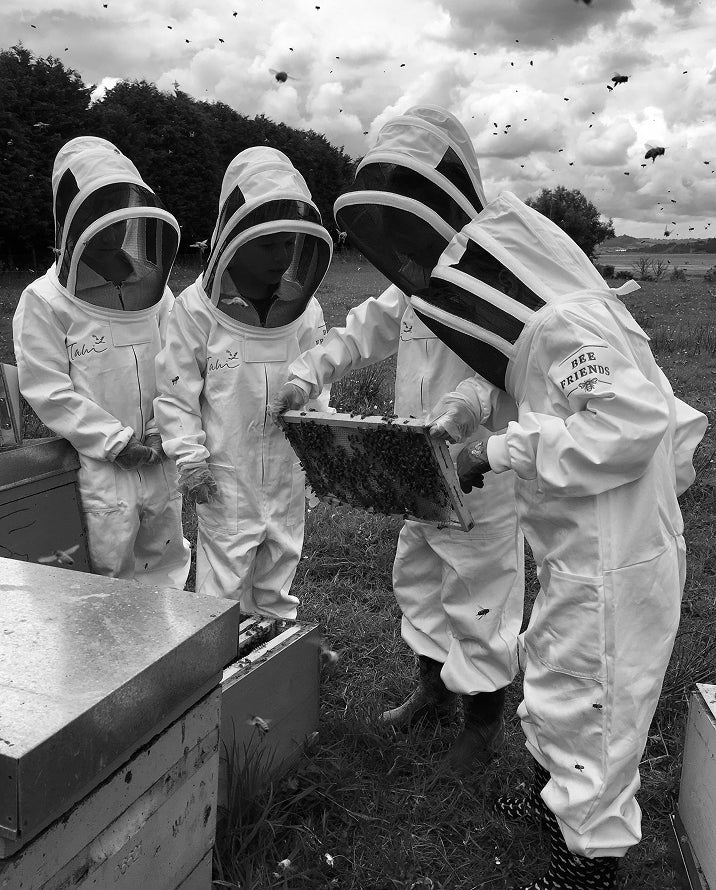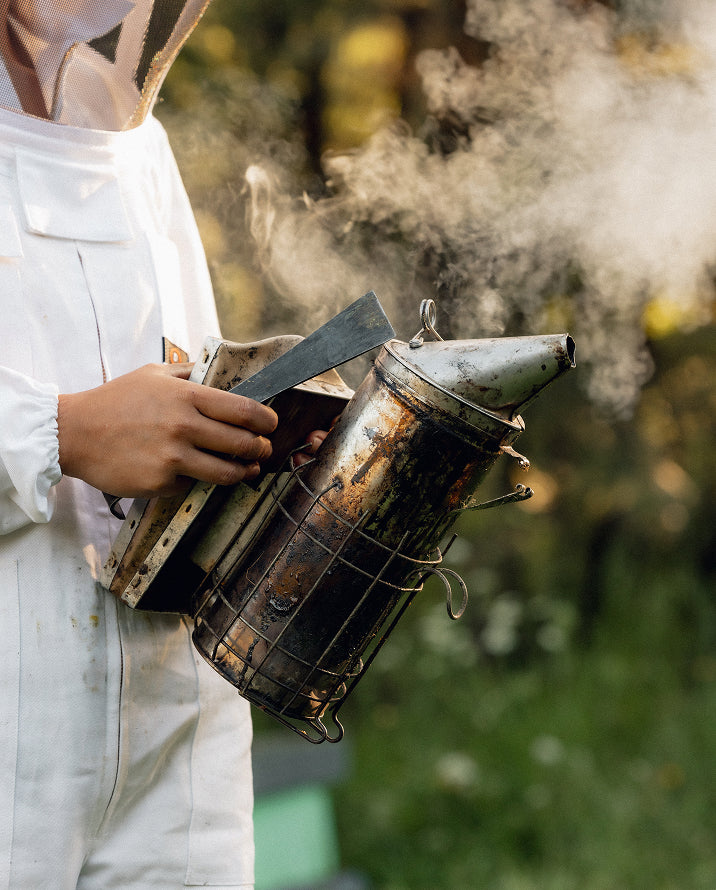Bee Friends Programme
From the hive to the classroom. A hands-on school programme that brings students face-to-face
with the world of bees, fostering curiosity, connection, and a lifelong respect for nature.


Bee Friends Programme
the buzz of biodiversity
Our popular Bee Friends Programme sees us partner with local schools to educate students and raise awareness of the importance of bees and beekeeping. Our goal is to share our knowledge, provide access to fun and educational materials to awaken young minds to the beautiful natural world we live in. Each school gets the opportunity to make their own honey and sell it to raise funds for their school or charity projects.

See the buzz in action. Students connect with bees, nature and the real-life science behind pollination and ecosystem care.

Learn the art of ethical bee-keeping: our practices ensure the well-being of our bee colonies and their important role in pollination
Enquire About Bees in Schools Programme
If your school is interested in becoming part of Tahi’s Bee Friends programme, please email admin@tahinz.com. Our programme is currently limited to schools in Northland, New Zealand.
Email Us
admin@tahinz.comVisit our Eco-Lab
Tahi New Zealand, 1824 Pātaua North Road,
RD 5, Whangarei 0175, New Zealand
Call Us
+64 9 436 0082Frequently Asked Questions
-
General
-
Mānuka honey is gathered from the flowers of the Mānuka Tree native from New Zealand (Mānuka is the indigenous Maori name for leptospermum scoparium). Mānuka honey is considered a superfood and is revered for its unique qualities. The Mānuka Tree is an ancient healer and has been used in traditional Māori medicine for centuries.
-
The absolute minimum safeguard against fake Mānuka honey is to make sure that it was harvested, tested, certified, packed and labelled in New Zealand. Strict New Zealand regulations do not apply to Mānuka honey sold in bulk offshore that is not packaged in New Zealand!
TAHI is a licensed member of the UMF Honey Association (UMFHA). The UMFHA is an independent body established in New Zealand in 1998 to test, control and protect New Zealand’s Mānuka honey industry. It is the only grading system that measures all 4 chemical markers (identified by New Zealand’s Ministry of Primary Industries) present in Mānuka Honey and is considered the strictest and most important Mānuka honey measurement system.
A company producing and selling UMF™ Mānuka honey must be licensed by UMFHA to sell Mānuka honey that is UMF™ rated and it is also required to have the UMF™ logo AND grading number on a label. Searching for a company’s license number can be done via the UMFHA website: www.umf.org.nz.
Each batch of Tahi honey undergoes a series of tests in an independent scientific laboratory and gets a UMF™ rating ranging from 5+ to 25+, which indicates the honey’s pureness and authenticity. UMF™ is the best way to ensure the purity and quality of Mānuka Honey.
The UMFHA is 100% transparent about what it tests and measures and those measurements, done by an independent testing facility approved by the MPI (Ministry for Primary Industries) are available on the UMFHA website thanks to the batch number displayed on your jar of honey. -
Honey does not expire however it can change so it is important to store it properly and not expose it to too much heat.
Ideally it should be kept in a stable temperature area below 77 °F (25 °C), away from sunlight. Even better if you keep it in your fridge!
-
Yes, kids can eat Mānuka honey, but like any other honey infants under 12 months old should not eat it as their digestive system is not mature enough to handle honey.
-
Tahi Mānuka honey is harvested from some of New Zealand’s most remote and pristine locations. It is raw and natural, just as nature intended - No overheating, no pasteurising and no artificial anything - It is free from GMOs and GE, with no added sugar, water or chemicals.
All Tahi honeys are independently tested and certified Glyphosate Free, Gluten Free and Non-GMO project certified. -
Mānuka honey contains high levels of Methylglyoxal (MGO), a naturally occurring compound present in most honeys in small amounts (typically 1 to 10 mg/kg). In Mānuka honey, however, MGO concentrations can be more than 100 times higher.
Mānuka honey is the one of the rarest commercially harvested honeys on the planet. Because of its unique properties and increased use in the medical, dermatological and skin care industries, the global demand for Mānuka honey exceeds the supply. -
Mānuka honey is rare and precious, it is a very limited resource - Mānuka trees only grow in remote parts of New Zealand, it has a very limited harvest period and can only be collected at certain times of the year.
Tahi has built solid partnerships with landowners to make sure our hives are placed in the most optimal locations for good quality Mānuka Honey. We make sure landowners from the local communities get a fair deal for the honey produced on their land. It is also labour intensive to take good care of our bees – we have a high beekeeper to hive ratio.
To ensure our Mānuka is genuine & graded we follow the strict UMF™ certification. Each batch is independently tested in scientific laboratories. The tests ensure we meet strict government regulations and guarantee that consumers are getting genuine, authentic and pure Mānuka honey. -
Tahi is a licensed member of the UMF™ Honey Association. UMF™ stands for “Unique Mānuka Factor”, it is a global standard that measures the purity and quality of monofloral Mānuka honey. Each batch of honey undergoes a series of tests in a government-approved independent testing facility and gets a UMF™ rating.
The UMF™ rating (the number on the jar) is the measure of the unique properties found in Mānuka honey. The bigger the number, the more potent the honey. The UMF™ scale starts at 5 and goes to 30, however 20 and above are very rare. Methylglyoxal (MGO) is the main organic compound found in Mānuka honey used to measure its potency. There is a direct scientific correlation between the UMF™ and the MGO ratings:
UMF™ 5+ = MGO 83+
UMF™ 10+ = MGO 263+
UMF™ 15+ = MGO 514+
UMF™ 20+ = MGO 829+
UMF™ 23+ = MGO 1043+
UMF™ 25+ = MGO 1200+
However UMF™ means more than simply MGO. It also measures other key markers such as:
- Leptosperin, ensuring the authenticity of mānuka honey.
- Dihydroxyacetone (DHA), ensuring the shelf life of mānuka honey.
- Hydroxymethylfurfural (HMF), ensuring the freshness of mānuka honey.
By doing this group of tests it ensures that the MGO levels have not been artificially changed, or boosted by overheating, and the special activity of your mānuka honey will remain constant throughout its shelf life.
The batch number displayed on every jar of Tahi honey ensures its traceability and customers can retrieve the test reports from the www.umf.org.nz website by entering Tahi’s license number 2035 and the batch number displayed on your jar of honey. Tahi display both the UMF™ and the MGO gradings on their jars of monofloral mānuka honey. -
Unlike refined, processed sugar and other sweet alternatives, Mānuka honey is far more than empty calories. It is a complex superfood that contains an abundance of benefits.
It is a sweeter, more nutritious alternative to white sugar, with a more balanced energy release.
It contains phenolic acids and flavonoids, which makes it a powerful source of natural antioxidants. It also contains minerals, vitamins and prebiotics to support a balanced microbiome. -
100% of profits from the sales of our honey and skincare products go back into restoring and regenerating our natural environment.
Tahi honey is eco-friendly, biodiversity positive and carbon negative. We follow a sustainable philosophy called the “4C’s”: Community, Culture, Conservation and Commerce. These guide us in our decision making: from conserving wildlife to using renewable energy; from preserving local culture to teaching future generations to take care of our planet, and our bees.
We use ethical beekeeping methods: we respect and care for our bees. This means we don’t feed them sugar water (as has been standard in the honey industry), corn syrup or antibiotics and we leave them with enough honey in their hive to keep them well fed over winter. We don’t use pollen traps because they can damage the bees’ delicate wings, nor do we collect bee venom as it can harm or even kill bees. Healthy bees = great honey.
We have won many awards for our environmental work and the quality of our honey. -
The difference between the pure Mānuka honeys is their activity level (defined by the UMF™ number) – the higher the number the more active the honey and the more intense the flavour and the wellness support.
In terms of taste, the non-UMF™ honeys are sweeter than the UMF™ honeys. More traditional. UMF™ honeys start to exhibit a depth of flavour. As you go up the scale it starts to exhibit a more intense, complex, tangy flavour profile.
In terms of which honey to choose, it depends what you want to use it for. Lower grades would be best for cooking or everyday wellbeing and the higher grades are more for specific / targeted use, such as to support your immunity and balance your gut health. -
Sustainability
-
We work hard to offset our carbon footprint based on a strategic ecosystem restoration system. What does this involve? At Tahi, our award-winning conservation nature sanctuary in New Zealand, we have restored nearly 800 acres of land to a flourishing, biodiverse ecosystem, increasing bird and plant species, as well as wetlands and indigenous trees, which ultimately works as a carbon sink. We are now expanding our land by another 4,000 hectares. By planting trees native to New Zealand, rather than pine, palm or hardwood species, which are traditionally planted to offset carbon but which only provide a short-term, limited benefit to the environment, we can help significantly offset our carbon footprint whilst also increasing biodiversity, helping Mother Nature for the long term.
Find out more about Tahi here: https://tahinz.com/ -
Thinking way beyond our company, our land and our community has always been in our DNA and shapes our sustainability philosophy at Tahi. Our work is based around four key pillars:
1. Beyond Net Zero:
Our commitment to offset more carbon than we use through ecosystem restoration on our own land in New Zealand.
2. Environment-first financial model:
100% of profits are returned directly to our conservation and community projects for a lasting impact.
3. Responsible consumerism:
Our advocacy to inspire and motivate others to become more responsible consumers.
4. Culture & community:
Our ongoing investment to culture and community, fundamental to building a healthy and resilient ecosystem.
From our commitment to only use manufacturing processes that respect the environment, to our promise to support New Zealand’s precious biodiversity for generations to come, protecting, educating and enhancing our place, people and planet is our driving force. Learn more about our sustainability philosophy and practices: https://tahinz.com/ -
100% of profits are reinvested into biodiversity regeneration.
Every product you purchase plays an active, critical role in driving our vision and generating a meaningful impact on our people, our community and our planet. -
Tahi claims to be carbon negative. How do you offset your carbon footprint?
-
Tahi claims to be carbon negative. How do you offset your carbon footprint? We’ve consciously chosen 100% recyclable PET plastic jars for all of our honeys, rather than glass. Why? Glass jars aren’t made in New Zealand, so to import and export the jars would have a significant carbon footprint – the opposite of TAHI’s “reduce, reuse, recycle” philosophy. Glass jars are also significantly heavier so more energy is required to ship them around the world. Plastic also requires less protective packaging, again helping to reduce our footprint.
We offset the light carbon footprint that we do have through planting and wetland restoration. It’s our way of going one better for nature, in every way we can. -
Shipping
-
We ship to the UK. Delivery costs are £6. They are free for all orders over £60.
-
Orders are typically delivered in 1-3 business days. During sales and peak holiday season the delivery window can increase to up to 5 business days. If you did not receive your order please contact us at contact@tahihealth.co.uk with your order number.
-
All the orders have a tracking number that you will receive by email, along with a tracking link.
-
Returns
-
We have a 14-day return policy, which means you have 14 days after receiving your item to request a return.
To be eligible for a return, your item must be in the same condition that you received it, unopened and in its original packaging. You'll also need the receipt or proof of purchase.
To start a return, you can contact us at contact@tahihealth.co.uk. If your return is accepted, we’ll send you instructions on how and where to send your package. Items sent back to us without first requesting a return will not be accepted.
You can always contact us for any return questions at contact@tahihealth.co.uk. -
Please inspect your order upon receipt and contact us immediately if the item is defective, damaged, or if you receive the wrong item, so that we may evaluate the issue and make it right.
Damaged items can be eligible for a replacement. No refund will be issued in those cases.
Certain types of items cannot be returned, like perishable goods (such as food, honey), and personal care goods (such as beauty products, skincare). Please get in touch if you have questions or concerns about your specific item.
Unfortunately, we cannot accept returns on sale items or gift cards. -
We will notify you once we’ve received and inspected your return to let you know if the refund was approved or not. If approved, you’ll be automatically refunded on your original payment method within 10 business days. Please remember it can take some time for your bank or credit card company to process and post the refund too.
If more than 15 business days have passed since we’ve approved your return, please contact us at contact@tahihealth.co.uk